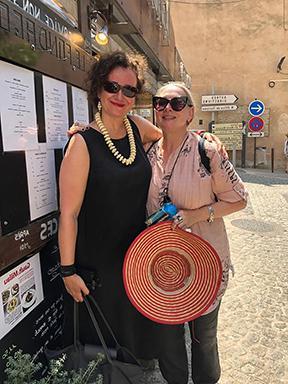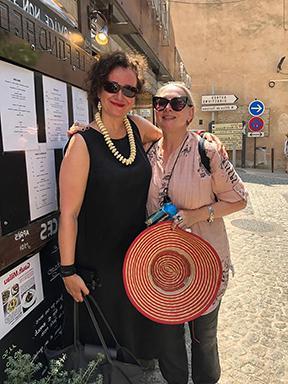挑战正典
A new student prize honors a Mawrter and the power of formal poetry.

The Susan de Sola Rodstein Derks Prize in Formal Poetry was established in memory of poet Susan de Sola Rodstein Derks ’84 with gifts from her family, 同学们, 和朋友.
BMC junior Leela R. Smelser ’24 was awarded the first annual Susan de Sola Rodstein Derks Prize in Formal Poetry for “the best portfolio of poems that gracefully utilize poetic form, 无论是传统的十四行诗, 六节诗, 维拉内拉诗, 等.)或新的和发明的形式.”
获奖作品节选如下, 比赛评委莫伊拉·伊根的84条评论, “This portfolio beautifully embodies Adrienne Rich’s old saying that form was ‘part of the strategy— like asbestos gloves, it allowed me to handle materials I couldn’t pick up barehanded.对位, 散文诗歌, ekphrasis, 还有一个villanelle, 诗人对神和怪物进行了探索和抨击, 神话和精神混乱, 黑色和红色, tooth and claw; with great sophistication, 每种形式都能协同传达内容, 这首诗的意思. 激烈的, vivid imagery and powerful sonic patterns (‘a crackling hellfire at the bottom of a ravine, the wind singing as it flows between the walls’) speak to the reader’s viscera. 没有什么是简单的, 但有一种清晰的感觉, 如果不是为了救赎, 然后, 至少, of hard-won wisdom: ‘the draw of sleep is heavy and sweet as / darkness falls layer by layer like organza.’
启示录(维拉内拉诗)
把你的悲伤带给野兽.
Carry with you whatever lie you must tell yourself, your justification.
献上它,见证他的盛宴.
你所爱的人已经死去,
and you, wallowing in the dregs of your deprivation,
把你的悲伤带给野兽.
Old wood cold against your knees, hands that shake from pieced
together tragedies – most of them of your own creation.
献上它,见证他的盛宴.
Your sorrow, the libations, your pain, supplication – you’re his only priest.
He thanks you for the offering, bemoaning his insatiable starvation.
把你的悲伤带给野兽.
It is a limited agony, mercy to come when you are released,
left with nothing but a hollow ache and newfound veneration.
献上它,见证他的盛宴.
当你蹒跚离去,太阳从东方升起,
你接受救赎的代价.
把你的悲伤带给野兽.
献上它,见证他的盛宴.
As inaugural student entrants polished their submissions this spring, contest judge Moira Egan ’84 and co-director of Creative Writing Airea D. Matthews met to discuss writing at 布林莫尔 and the radical power of formal poetry.
伊丽莎白MOSIER: What experience with form do students bring to your poetry courses?
马修斯迪: My students have some sense of poems needing certain containers, but they don’t necessarily recognize what the container is named. We often enter into poems with rhyme because rhyme feels decidedly poetic. Form opens up for students as they think about how it lets them say what they need to say with concision and clarity.
作为人类, we’re constantly trying to reconcile the paradoxical relationship between form and fluidity. I try to show students how they can have agency and freedom inside a form. Knowing the form well enough to break it from within is an act of revolution. Breaking something without knowing it is just anarchy.
莫伊拉伊根: 是的,是的,是的! 对我来说, 既是诗人也是老师, it’s fun and rewarding to not break a single rule and talk back to the canon in its language: “Darling canon, 现在我要教你几件事.”
DM: 完全. Using form shows range and the ability to code switch, to change registers between the contemporary and the canonical—to speak the canonical language and move poetry forward.
EM: 什么激进的力量形成了解放?
ME: 形式是所有的“F”字:自由,灵活,有趣. 形式带来了自由诗所没有的凶猛. Form sets up expectations and constraints that push your imagination to places it might not go on its own.
DM: Music, particularly music composition, provides incredible forms. What would happen if you created a 12-tone scale with words? 形式是一种玩耍的方式,是一种挑战自我的方式. I want to create a contrapuntal mixed with a pantoum—though I don’t know what that is or what to call it. After I mentioned this in class last year, a student brought in a contrapuntal pantoum. 圣牛!
EM: What are the particular challenges of learning to read and write as a poet at an academic institution like 布林莫尔?
ME: I love, and felt terrified by, 布林莫尔’s intellectual rigor. 给自己定个高标准是件好事, but perfectionism can keep you from putting words on the page. Ask yourself what you want a poem or a manuscript to achieve—and don’t put on the editor hat too soon.
DM: 对诗人来说,观察是至关重要的. 我问学生他们在作业中观察到了什么. Number the lines, pay attention to the enjambment, look at the structure, the rhythm, the story. Our discussion of a poem is based initially on what the writer is asking: Is what I do here effective? 我能做些什么不同的事情? 然后在考虑过程中, 读者给出了潜在的建议, 我们称之为“考虑因素!,因为作者——或者真的, 诗决定了它需要什么. 在创意课堂上, this dialogic model gives students a stake in others’ work, and the breadth and depth of discussion about how the poem is constructed teaches them about their own work.
ME: One of the great poets of observation, Marianne Moore (Class of 1909) comes to mind. To have our 布林莫尔 sister as a model for what we do in the classroom feels nicely self-reflexive and useful.
EM: What role does reading poetry play in writing poetry?
ME: 成为任何一种艺术家, 你必须了解自己的出身, 向他们学习, 并与之抗争. 你打算如何处理之前的事情? That’s the exciting thing: incorporating and metabolizing those voices and infusing your work with those influences.
DM: 如果你的神经元在放电,中枢是什么? 谁在积极地影响你? 对我来说, Robert Hayden—but I would not know that had I not read Robert Hayden. I’m part of a burgeoning school of poets called The Detroit School, 追踪这种血统是很重要的.
Reading poetry, you find unexpected connections, too. What does a Black woman from Detroit have in common with Anne Sexton? 我问自己. 当你阅读时, 你和作者进行了一次对话, and in those conversations the creative impulse emerges and eventually gets you to the page. 刚读. 阅读一切. 问问题. That’s how you become a critical thinker, which helps the poetic impulse.

